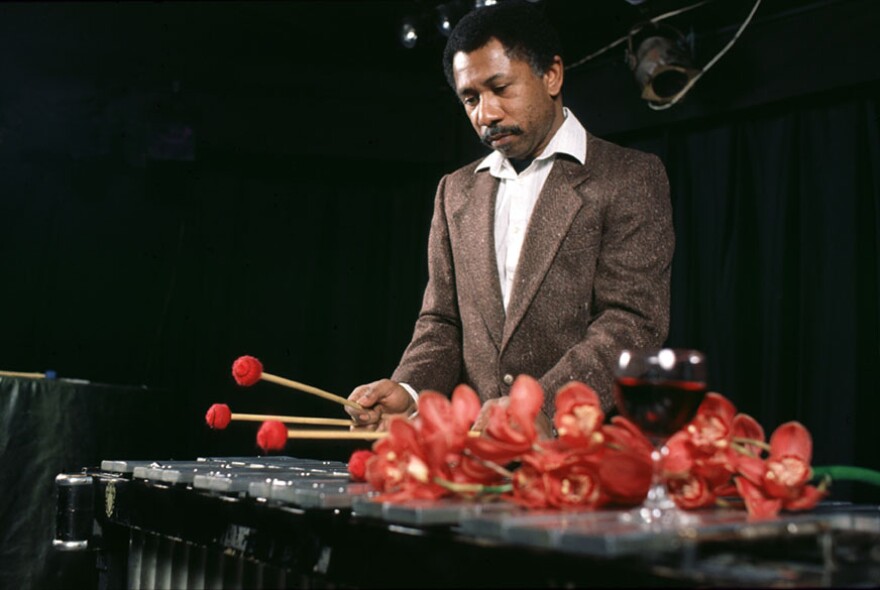Khan Jamal, a vibraphonist who combined the ethos of a spirit-seeking avant-garde with elements of jazz-funk and post-bop, died at Chestnut Hill Hospital in Philadelphia on Monday. He was 75.
The cause was kidney failure, his eldest son, Khan Jamal II, tells WBGO.
From the early 1970s on, Jamal was a dynamic musical presence in Philadelphia, his adopted hometown. A lifelong student of the vibraphone, he mastered a jazz language set by Lionel Hampton and Milt Jackson and further refined by Bobby Hutcherson. But he also came up at a time of emphatic self-determination for Black-owned artist initiatives, within a generation striving to reconcile an explosion of form (free jazz) with an expression of groove (jazz fusion). Jamal straddled that divide, if indeed he ever saw it as one.
“Khan had a very warm sound,” says guitarist Monnette Sudler, a band mate in the early-‘70s collective Sounds of Liberation. “He liked to play avant-garde, but then he was also very melodic. I would say he was versatile in his approach to music, which is something we both developed working in the same group.”
That ability to shift modes and moods suited Jamal well in a range of settings. He was prolific if underrecognized as a bandleader, and something of a secret weapon as a sideman. His associations included tenor saxophonists Archie Shepp and Frank Lowe; trombonist Grachan Moncur III; and drummer Ronald Shannon Jackson, in whose Decoding Society he briefly played in the early 1980s. Earlier in his career, Jamal had also passed through the ranks of the Sun Ra Arkestra, and joined other former Arkestra members in a band called Cosmic Forces.

Sounds of Liberation, which he founded in Philly’s Germantown neighborhood in 1970, quickly evolved into a cooperative in the spirit of the age. Jamal’s vibes and Sudler’s guitar were part of a richly textured front line, alongside the soulfully incisive alto saxophonist Byard Lancaster. The group’s intensity was fueled by a powerhouse rhythm section featuring Billy Mills on bass, Omar Hill and Rashid Salim on percussion, and Dwight James on drums.
The band released one album, originally titled New Horizons, on its own Dogtown label in 1972. Its impact was barely felt outside of Philadelphia, though it has since acquired a glowing cachet. “I first became aware of the record when a young guy in the neighborhood came into the shop and brought in an acetate that he’d found at Goodwill,” recalls Peter “Max” Ochester, owner and proprietor of the Philly record shop Brewerytown Beats. “There was no cover, it was literally handwritten, ‘Sounds of Liberation,’ and had the song titles. We started researching it and found out that it was this amazing Philly free-jazz record.”
New Horizons, also known simply as Sounds of Liberation, was finally reissued on Porter Records in 2010. Lancaster died two years later, but the remaining members of the group had a chance to experience renewed interest in its brand of spiritual jazz, which led to the realization of Unreleased, a 1973 recording made at Columbia University. Ochester produced that album with the remaining band members; it was issued in 2019 on Dogtown / Brewerytown Records, to widespread acclaim. Among its highlights is a version of “Badi,” a composition by Jamal.
Khan Jamal was born Warren Robert Cheeseboro on July 23, 1946, in Jacksonville, Fla. His father, Henry McCloud, was an entrepreneur, and his mother, Willa Mae Cheeseboro, played stride piano.
He grew up in Philadelphia, where he started playing the vibraphone in his late teens. His musical education took place at the Granoff School of Music, which Dizzy Gillespie and John Coltrane had also attended, and the Combs College of Music, which has a classical pedigree. Jamal also studied privately with Bill Lewis; they later made an album of vibraphone-marimba duets.
Jamal is survived by a brother, Johnny McGee; two sons, Khan Jamal II and Tahir Jamal; and three grandchildren, Kiyani Jamal, Mahogany Jamal and Khan Jamal III.
Though he never became a household name, Jamal maintained a high level of respect in this century, performing often at the Vision Festival and appearing on noteworthy albums by saxophonist Jemeel Moondoc, trumpeter Roy Campbell and pianist Matthew Shipp.
And the Sounds of Liberation story amounts to just one chapter in his recent archival renaissance. Drum Dance to the Motherland, a 1973 Dogtown release by the Khan Jamal Creative Art Ensemble, was his first proper solo effort; a little over a year ago, it received a deluxe reissue treatment from Eremite Records, which declared it “the most legendary private press underground jazz album of the 1970s.”
Also within the last year, the Jazz Room label reissued Jamal’s 1984 album Infinity, a long-sought-after record featuring Byard Lancaster on alto saxophone and flute, Bernard Sammul on piano, Clifton Burton on harmonica, Reggie Curry on bass, Dwight James and Sunny Murray on drums, and Omar Hill on percussion. The album is a certifiable classic of the Black music subgenre we’ve taken to calling “spiritual jazz,” and all but one of its compositions is by Jamal. Here is “The Known Unknown,” a modal swinger whose title predates Donald Rumsfeld’s infamous elocution by almost 20 years.
“Khan was an innovative musician, and he liked to keep it moving,” recalls Sudler. “He’d stay in a groove for a while, and if he found that he wanted to change his musical perspective, he would do that. He encouraged me to do the same thing.”
She adds: “He was very open to different ideas, and he was a go-getter. When he wanted to make something happen, he would try to make it happen.”



